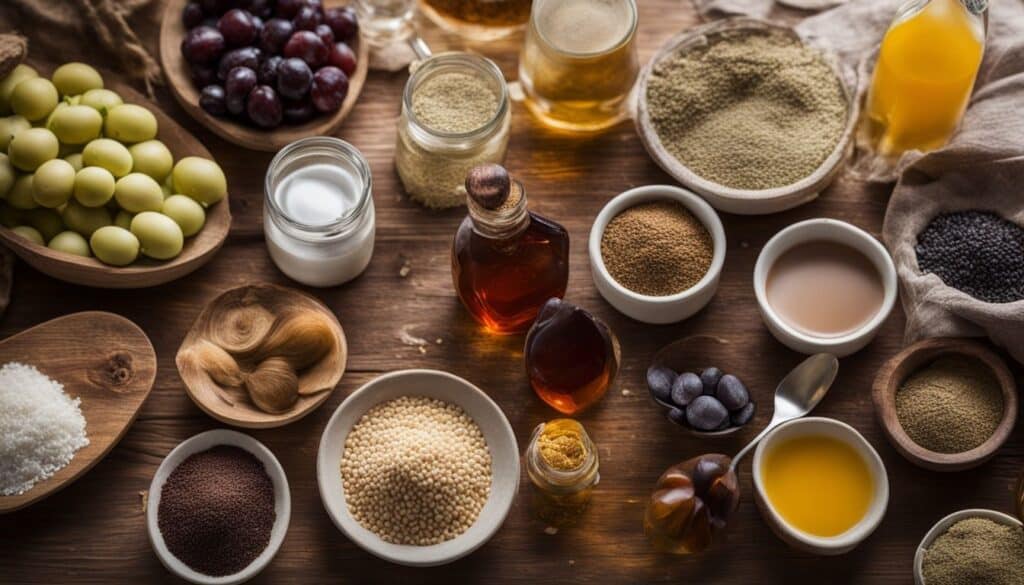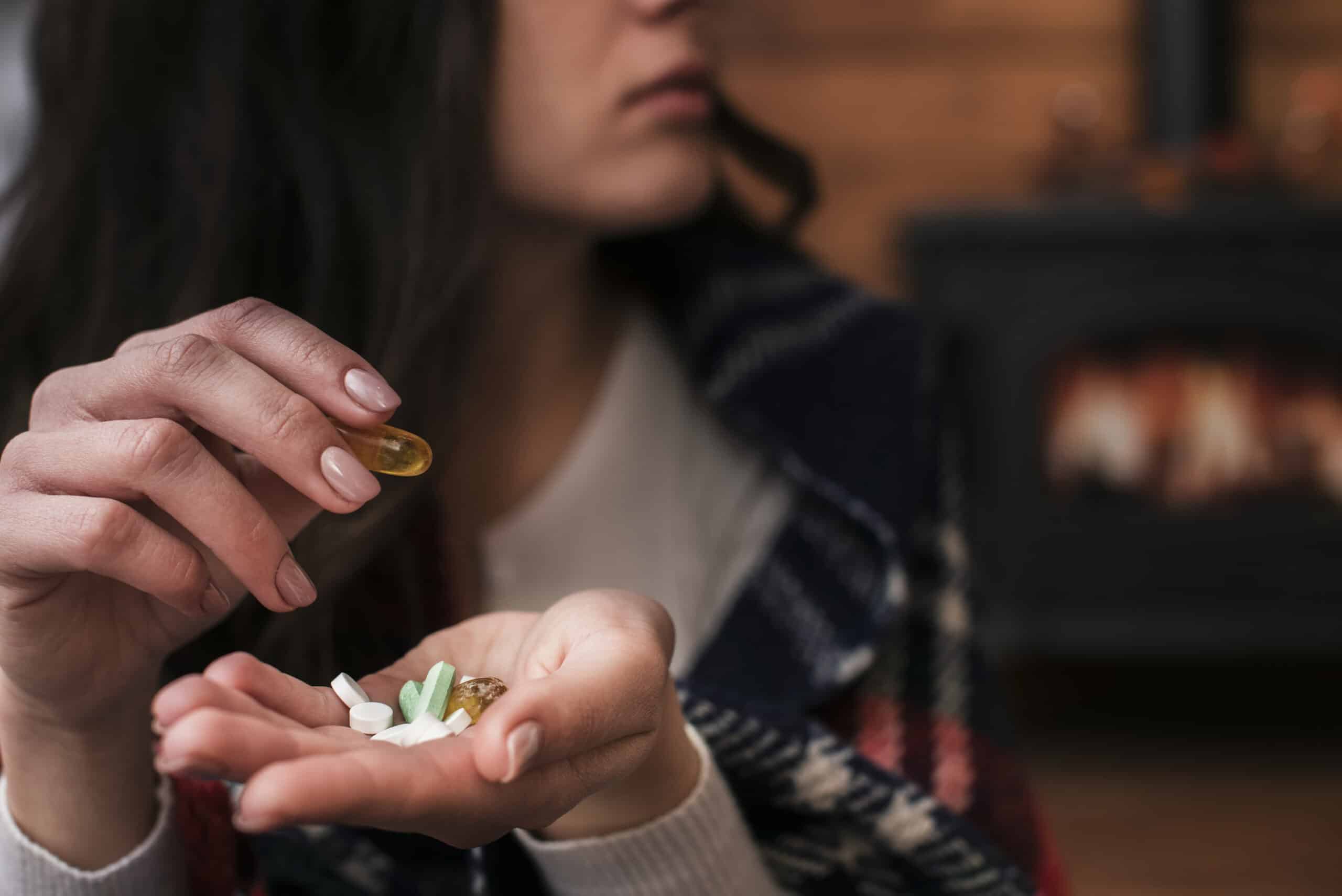Safe Dosages For Selenium Supplements

Navigating the world of supplements can be confusing, especially when understanding how much is safe to take. Selenium, an essential mineral for health, has a recommended daily allowance of 55 micrograms for adults and children aged 4 and older.
This blog post will guide you through the safe dosages of selenium supplements, helping you reap their benefits without risking your health. Let’s dive in and ensure you’re on track with your selenium intake!
Key Takeaways
- Adults should take 55 micrograms of selenium daily, but pregnant women need 65 mcg, and breastfeeding women require 75 mcg.
- Too much selenium can cause bad breath, tiredness, and even severe issues like kidney failure. The safe upper limit is 400 micrograms for adults.
- Foods like Brazil nuts, fish, and eggs are rich in selenium; one Brazil nut a day can meet the daily need.
- Always talk with a healthcare provider before starting supplements to ensure they’re safe.
- Selenium helps your immune system and acts as an antioxidant to protect your body.
Understanding Selenium Supplements

Selenium supplements come in various forms and are used to support overall health, including thyroid function and immune system support. It can also be found naturally in foods like Brazil nuts, fish, and eggs.
Proper dosage and intake methods are essential for reaping the benefits of selenium supplementation.
Uses and Effectiveness
People take selenium supplements to help their bodies. These tiny helpers may make your immune system stronger and keep your hair and nails looking good. Some even think it can protect against certain types of cancer, but science isn’t sure about that yet.
We know that selenium works well for keeping a healthy weight and building muscle.
But don’t get too excited just yet. If you have heart problems, these supplements might not stop them from getting worse or prevent a heart attack. Understanding what work they can or cannot do is important before you include them in your daily routine.
Dietary sources
Selenium is a trace mineral that your body needs. It is found in various foods, so you can get your daily dose from what you eat.
- Brazil nuts: One nut can give you more than 100% of the selenium you need daily.
- Fish: Tuna, halibut, and sardines are great choices for selenium.
- Meat: Beef, chicken, turkey, and ham have good selenium.
- Eggs are an easy way to add selenium to your diet.
- Brown rice: This whole grain is a tasty way to get more selenium.
- Sunflower seeds: Snack on these for a selenium boost.
- Baked beans: These are not just high in fiber but also have selenium.
- Mushrooms: Add these to your meals for extra nutrients, including selenium.
- Oatmeal: Start your day with a bowl, and you’ll get some selenium, too.
Available forms
Selenium supplements come in different shapes and sizes. You can find the one that fits your needs best.
- Selenomethionine: This is a form of selenium bound to an amino acid (methionine). Your body can easily use it. Many see this as a good choice for raising selenium levels.
- Sodium selenate: Another type is sodium selenate, but it’s less common. Your body absorbs it well, too. Still, some worry about its safety at high doses.
- Yeast-bound selenium: You can also get yeast-based supplements. They have natural forms of selenium. People say these are like what you get from food.
- Multi-vitamin/mineral supplements: These have smaller amounts of selenium. They aim to fill in gaps in your diet.
- Antioxidant formulas: Some supplements are part of antioxidant blends. They often include vitamins E and C along with selenium to help protect your cells.
How to take it
To take selenium supplements for improving health, consider the following guidelines:
- Know the Recommended Dosage: Ensure you know the recommended daily intake of selenium based on your age and gender. The range for adult and teenage males is 40-70 micrograms per day, while for adult and teenage females, it is 45-55 micrograms per day.
- Consider Special Conditions: If you are pregnant or breastfeeding, adjusting your selenium intake as advised is important. Pregnant and breastfeeding females should take 65 micrograms of selenium daily to support their nutritional needs.
- Consult a Healthcare Professional: Before starting any new supplement regimen, especially if you have existing health conditions or concerns, consult a healthcare professional. They can provide personalized recommendations based on your health status.
- Choose High-Quality Supplements: When purchasing selenium supplements, opt for reputable brands known for their quality and safety standards. Be cautious about the dosage in each serving to ensure it aligns with your individual needs.
- Monitor Your Intake: Keep track of your selenium intake from supplements and dietary sources to prevent exceeding the safe upper limit of 400 micrograms per day for adults.
- Be Consistent: If you decide to include selenium supplements in your routine, consistency is key. Follow the recommended dosages consistently to effectively support your overall health without risking potential overdose.
- Seek Balanced Nutrition: While supplements can be beneficial, they should complement a balanced diet rich in whole foods containing essential nutrients, including selenium.
Recommended Dosages for Selenium

The recommended daily intake of selenium for adults is 55 mcg per day. However, higher amounts may be beneficial for certain health conditions. Keep reading to learn more about the health benefits and potential risks associated with selenium supplementation.
Recommended amounts
Understanding the proper dosage of selenium is crucial for those aiming to improve their health through supplements. Here, we provide a detailed summary of the recommended amounts, tailored to various life stages and conditions, for easy reference.
| Population | Recommended Daily Amount of Selenium (mcg) |
| Adults and children age 4+ | 55 |
| Teenage males | 40-70 |
| Teenage females | 45-55 |
| Pregnant females | 65 |
| Breastfeeding females | 75 |
| Infants up to 6 months | 15 |
| Infants 7 to 12 months | 20 |
These figures come from established dietary guidelines designed to ensure adequate intake without reaching levels that could cause toxicity. Adults, depending on their gender and life stage, have different requirements, with pregnant and breastfeeding women needing slightly more to support their health and that of their baby. Infants have much lower needs, reflecting their smaller size and developmental stage. It’s essential for anyone considering selenium supplements to adhere to these guidelines to maintain optimal health.
Health benefits
Selenium is a powerful antioxidant that reduces the risk of certain cancers and protects against heart disease.
- Boosts immune function and supports overall health
- Improves hair and nail health
- Works as an antioxidant, especially when combined with vitamin E, defending against free radical damage and inflammation
- Plays a key role in increasing immunity and overall antioxidant activity in the body
Signs of deficiency and toxicity
When there isn’t enough selenium in the body, it can lead to health problems. For instance, signs of selenium deficiency can include hair loss or a weakened immune system. On the other hand, taking too much selenium can also be harmful.
Symptoms of selenium toxicity may include bad breath, fatigue, and stomach issues. To avoid these potential risks, it’s important to be mindful of how much selenium you consume.
Remember that an overdose of selenium can cause severe symptoms such as difficulty breathing or kidney failure. Additionally, high doses of selenium might result in significant side effects like nail changes or irritability.
Precautions When Taking Selenium Supplements
When taking selenium supplements, it’s important to be aware of potential interactions with medications and other supplements. Additionally, certain populations, such as pregnant or breastfeeding women, should take special precautions when considering selenium supplementation.
Potential interactions
Potential interactions:
- Selenium may interact with certain medications, supplements, or nutrients, potentially altering the way selenium or medications work.
- Some medications, such as antacids, proton pump inhibitors, and H2 blockers, may reduce the absorption of selenium from supplements or food.
- Selenium can interact with blood thinners like Warfarin and increase the risk of bleeding. It’s important to consult a healthcare professional before taking selenium supplements if you’re on blood thinners.
- Certain cancer treatments like cisplatin and sunitinib may have reduced effectiveness when taken with selenium supplements.
- Combining selenium with zinc supplements may interfere with the absorption of both minerals in the body.
Side effects and warnings
Excessive selenium intake may lead to side effects and warnings that should be considered. Here are the potential side effects and warnings:
- Overdose symptoms: Bad breath, hair loss, fever, tiredness, and nausea.
- Severe problems: Extremely high doses of selenium might cause difficulty breathing, tremors, kidney failure, heart attacks, and heart failure.
- Fatal complications: High intakes of selenium can lead to potentially fatal complications, including heart attack and respiratory depression.
Special precautions for certain populations (pregnant or breastfeeding women)
Pregnant and breastfeeding women should pay special attention when taking selenium supplements. Here are important precautions to consider:
- Pregnant women need 60 mcg of selenium while breastfeeding women require 70 mcg daily.
- Evidence suggests that some studies have used 200 mcg daily for certain conditions, but precautions should be taken.
- Selenium supplementation in pregnant women can prevent early infant death, but its effects on maternal health remain unclear.
- Consider the influence of selenium supplementation on postpartum thyroid status in pregnant women with thyroid peroxidase autoantibodies.
- Special precautions may be needed when taking selenium supplements during pregnancy or while breastfeeding.
FAQs
Q: What is selenium deficiency?
A: Selenium deficiency is when the body lacks enough selenium, an essential mineral for human health and well-being.
Q: What are the sources of selenium?
A: Selenium can be found in various sources such as Brazil nuts, seafood, meat, poultry, dairy products, and whole grains.
Q: What are the benefits of selenium?
A: Selenium has several benefits, including supporting the immune system, acting as an antioxidant, and playing a role in thyroid function.
Q: What are the recommended selenium intakes?
A: The recommended daily intake of selenium for adults is around 55 micrograms per day.
Q: What are some foods containing selenium?
A: Foods containing selenium include Brazil nuts, seafood, poultry, eggs, cottage cheese, sunflower seeds, and whole wheat bread.
Q: What are the risks of selenium?
A: High selenium levels can lead to selenosis, while low selenium levels may increase the risk of certain health issues. It’s important to maintain a balanced selenium intake.
Q: What is the association of selenium with cancer?
A: Some research suggests that selenium may play a role in the nutritional prevention of cancer, but more studies are needed to confirm the link.
Q: What is the effect of selenium supplementation?
A: Selenium supplementation may benefit individuals with low selenium status, but it’s important to consult a healthcare provider before starting any supplements.
Q: What are the best sources of selenium?
A: Whole foods such as Brazil nuts, seafood, and poultry are considered the best sources of selenium due to their natural and balanced selenium content.
Q: What are the effects of selenium on cancer?
A: Although selenium may affect cancer prevention, it’s essential to maintain a healthy and balanced diet and consult a healthcare professional for personalized advice.

